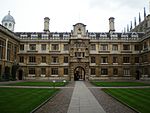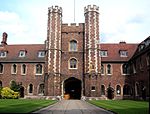Trinity College is a constituent college of the University of Cambridge. Founded in 1546 by King Henry VIII, Trinity is the largest Oxbridge college measured by the number of undergraduates and has the largest financial endowment of any college at either Cambridge or Oxford.
Members of Trinity have been awarded 34 Nobel Prizes out of the 121 received by members of Cambridge University (the highest of any college at either Oxford or Cambridge). Members of the college have received four Fields Medals, one Turing Award and one Abel Prize. Trinity alumni include the father of the scientific method (or empiricism) Francis Bacon, six British prime ministers (the highest of any Cambridge college), physicists Isaac Newton, James Clerk Maxwell, Ernest Rutherford and Niels Bohr, mathematicians Srinivasa Ramanujan and Charles Babbage, poets Lord Byron and Lord Tennyson, writers Vladimir Nabokov and A.A. Milne, historians Lord Macaulay and G. M. Trevelyan and philosophers Ludwig Wittgenstein, Bertrand Russell, and G.E. Moore.
Two members of the British royal family have studied at Trinity and been awarded degrees: Prince William Frederick, Duke of Gloucester and Edinburgh who gained an MA in 1790, and King Charles III, who was awarded a lower second class BA in 1970. Royal family members who have studied at Trinity without obtaining degrees include King Edward VII, King George VI, and Prince Henry, Duke of Gloucester. Trinity's many college societies include the Trinity Mathematical Society, the oldest mathematical university society in the United Kingdom, and the First and Third Trinity Boat Club, its rowing club which gives its name to the May Ball. Along with Christ's, Jesus, King's and St John's colleges, it has provided several well-known members of the Cambridge Apostles, an intellectual "secret society". In 1848, Trinity hosted the meeting at which Cambridge undergraduates representing fee-paying private schools codified the early rules of Association Football, known as the Cambridge Rules. Trinity's sister college is Christ Church, Oxford. Trinity has been linked with Westminster School since the school's re-foundation in 1560, and its Master is an ex officio governor of the school. Trinity maintains a connection with Whitgift School, Croydon: John Whitgift, the founder of Whitgift School, was master of Trinity 1561–1564.












